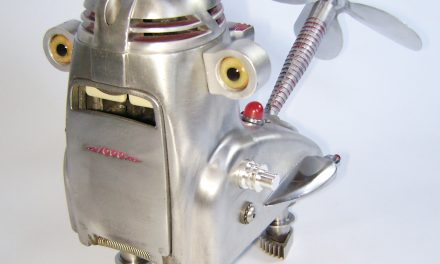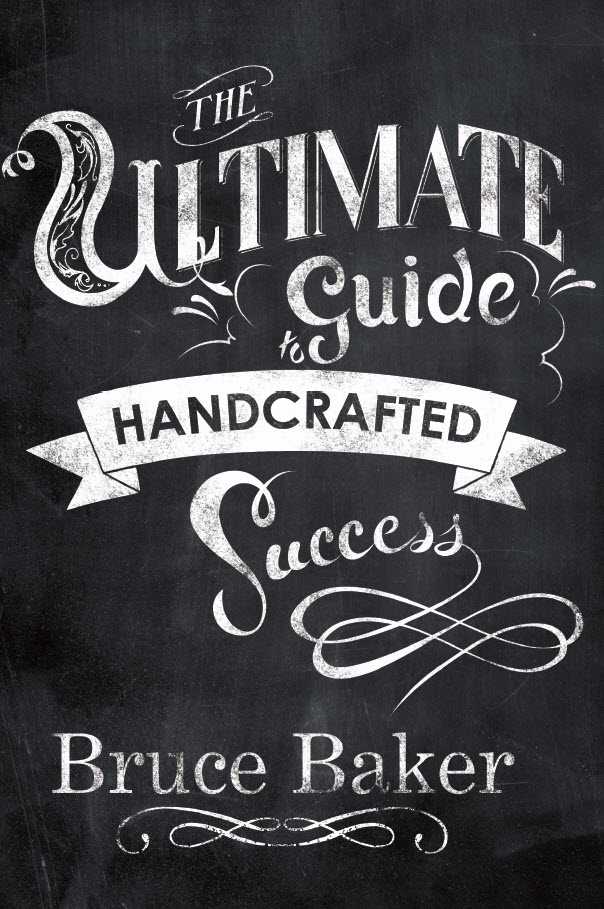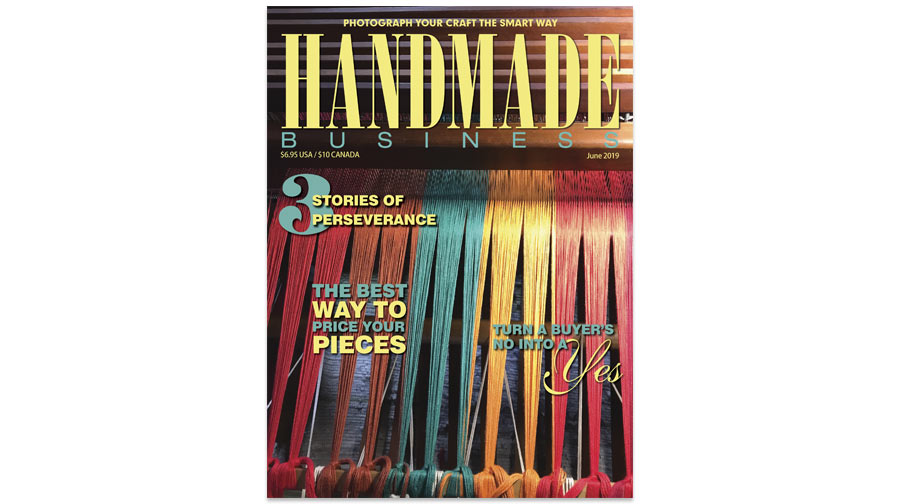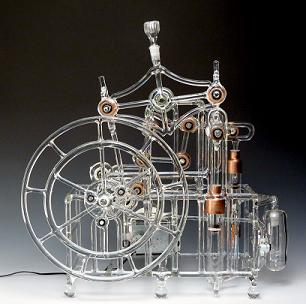
By Stephanie Finnegan
Shakespeare might have pondered, “What’s in a name?” For Bandhu Dunham, there is insight, significance, and liberation. Born Scott Dunham in Dayton, Ohio, in 1959, Dunham received the new name of “Bandhu” from his spiritual teacher, Lee Lozowick. “My name reflects a long commitment to my meditation practice and other spiritual disciplines that I pursue in connection with that relationship.” The name’s origin is Bengali and translates as “friend” or “brother.” That’s how Dunham conducts himself in his professional career—looking to share knowledge, mentor those who want to learn, and spread the wisdom that he has gleaned from the many roads he has traveled. When it comes to fledgling artists looking for a role model, Dunham is the real deal.
“Just call me Bandhu,” the glass artist clearly states. “No one but my mother calls me ‘Scott.’ Or if they do, they lose coolness points!” he jokes.
Lighting the Path for Others
Bandhu is a man who is not afraid to investigate unknown and unforeseen paths. He meshes the physical world with both his philosophical and pragmatic positions. Knowing that life can be a delicate, fragile balancing act, when he concentrated his talents in the world of glass lampworking, he found the perfect medium to reflect his own attitude and abilities.
“Glass is a magical material with built-in spiritual connotations. It is both fragile and resilient at the same time. For these and other reasons, it seems the perfect metaphorical material to explore the human condition. The lampwork technique is very practical, but also very versatile, so the sky’s the limit,” he declares.
For the uninitiated, Bandhu has literally written the book on lampworking—volumes one to three. “I shape glass rods and tubes in a gas-oxygen torch flame. The technique is ‘lampworking,’ but some people like to call it ‘flameworking.’ The name derives from the use of oil lamps to melt very soft glass years ago. Actually, the torches used to melt the glass nowadays are still referred to as ‘lamps’ in some circles,” he explains.
His books have become the go-to bibles for artisans who want to learn this craft, and Bandhu is both humbled and proud of this achievement. “People have told me things like, because of my books I have a degree of ‘ownership’ of the lampworking field as it exists today, or that my books helped reshape the field in the United States to have a more ‘kind’ quality. I don’t know about all that. A lot of people have done a lot of work to make the field what it is today. If I had some part in it, and if I helped it to feel like a more inclusive or welcoming community of artists, then I am pleased,” he admits.
“Lampworking is still a young field and will continue to grow and evolve. The destiny of lampworked glass is not in my hands or that of anyone else in the older generations. It’s in the hands of the younger people who are learning it now. I don’t have any kids of my own, so my many students are like spiritual offspring. In some small way, I get to live on through them. My job is to support them, and pass on what I know if they want to use that information. Interestingly, most of the universities where art is taught have still not stepped up to the plate and created any kind of lampworking program, even though it is one of the easiest things to do,” the educator remarks.
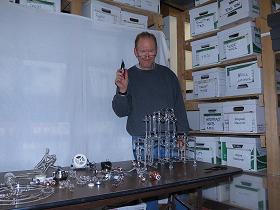
Breaking Through the Classroom Door
Bandhu’s wide-open optimism mingled with academic pessimism reflects the famous F. Scott Fitzgerald quote: “The test of a first-rate intelligence is the ability to hold two opposed ideas in mind at the same time and still retain the ability to function.”
The glass artist has a connection to the Gatsby author beyond this quotable quip. Both men have “Scott” in their names; both were Princeton University undergraduates; and both decided not to graduate from the esteemed place of learning. “I took a leave of absence, from which I never returned. I’m still waiting for them to award me an honorary degree like they did for F. Scott Fitzgerald,” he jokes.
While he was attending the college, Bandhu was busy exploring many of the interests that he exceled at. Gifted and bright, he was capable of having a successful career in many fields: “When it was time for me to graduate high school, as is often the case, well-meaning guidance counselors and other adults steered me away from an art degree and toward a science career, specifically chemical engineering. I suppose in another life I could have pursued that with some enjoyment, and I certainly would have more money at this point in my life,” he theorizes. “But at Princeton, as my engineering classes got more technical, and that whole competitive atmosphere closed in on me, I felt less and less inclination to follow that path. My artistic side was asserting itself more strongly—even aggressively. Chemical engineering was like a lead weight around my neck. Organic chemistry seemed to suck all the fun right out of it for me. Or maybe it was just all the pre-med students in my classes. I ended up changing my major from chemical engineering to chemistry then to visual arts.”
Though he didn’t return to college after his academic hiatus, he never stopped learning. “I have taken responsibility for my own education since then, as reflected in the research I had to do to write my books,” Bandhu shares.
Along the way to becoming an authority on the do-it-yourself aspects of lampworking, as well as a voice on the spiritual and emotional aspects of being a creative individual, Bandhu followed his heart and his soul into some other career selections.
“I took a break from glass at one point for a few years, and worked as a pastry chef. That was interesting, and there were actually some ways that working with chocolate reminded me of glass,” he muses.
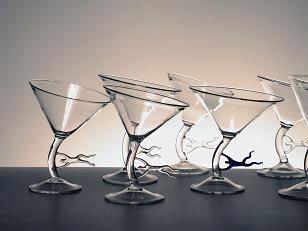
Artists Are People, Too
Still, he is most at home when he is in his studio and he is working with the tools and the medium he loves most.
“Glass is so addictive. You get hooked on it and compelled to make stuff, even if you don’t know what you’re doing. When I was first working on my book Contemporary Lampworking, someone who was supposedly an expert in the field said to me, ‘I know you want to tell people that they can just set up this equipment in their garage and do this, but you mustn’t. This belongs in academia. You should let the universities handle this.’ Well, I gave his supposedly wise words some thought and said, ‘Screw that!’ The whole point is that this is a very DIY technique. While good information is needed to help people learn and stay safe, the idea that we should have academics telling us what we should or shouldn’t do is ridiculous. Even serious art academics will tell you that sort of top-down control of art is a bunch of crap,” he stresses. “The homespun and even proletarian quality that you will sometimes encounter in lampworked glass is a very healthy thing. The best work will always rise to the top, and doesn’t need some control freak to point it out for us. We are not stupid.”
Bandhu champions the right of all people to express their inner visions and self-expression. An artist’s path shouldn’t be a rarified occupation for the BFA or MFA crowd alone. It is a vocation that a person is called to follow—a destiny, if you will. “I dropped out of engineering school to be an artist. It’s what I was put here to do.”
He encourages people to unleash their creative sides, but with well-honed advice: “Be a well-rounded person, a well-rounded artist or craftsman, and that will serve your business success in the long term and the short term, too. Finish high school at least; because the older you get, the more energy it takes to set aside time for learning. Because lampwork is a somewhat DIY technique, a lot of entrepreneurs in the field also dive into the business by the seat of their pants. Nowadays there are a lot of business tools available through the Internet, social media, and different kinds of incubators or cooperative business resources. I would encourage people to use those if they want to make this their livelihood.”
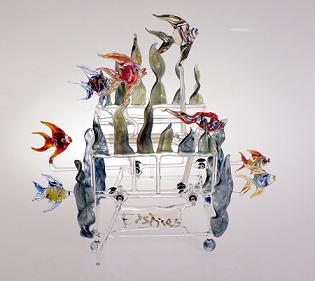
Works That Mirror His Soul
Beyond his seminars, books, and workshops, Bandhu also runs a business, Salusa Glassworks, which offers his sought-after one-of-a-kind creations, along with pieces that he designs and supervises apprentices in creating. The backstory of his company’s name is unexpected and revealing: “Salusa Secundus was the name of a planet in the Dune books. I was living in a house that resembled that planet at the time, and I set up my studio initially in the basement there, so I gave the business that name. People always think the name is “salsa,” especially since I live in Arizona now, but it has nothing to do with that.”
Among the many creations sold through Salusa Glassworks, his glorious menorahs stand out. Many people mistakenly believe he is Jewish because of his veneration of that religious artifact. “I’m not Jewish, but some of my clients are. I have always made glass trees, and someone suggested I could make a nice ‘tree of life’ menorah. Since the glass is heat-resistant, it’s a perfect fit. After some success with a couple of tree of life designs, I decided to ‘branch out’ and develop some other menorahs as well. Glass is such a spiritual material, and it plays so nicely with light. It seems very appropriate for celebrating Chanukah.”
Glass, which beckoned him with its siren call to leave his formal education behind, has managed to bridge the facets of his past with his present lifestyle: “The interplays between art and science always interest me, and glass merges these fields like no other material. The complexity and intricacy of moving glass parts is really fascinating to me. After almost four decades in the field, fanciful steam engines and other kinetic sculptures represent a full turn of the circle, back to the colorful, magical mysteries that captivated my childhood self. He’s still in there, and he wants you to come play, too.”
Able to use his hands to usher out all semblances of work—both fancfiful and functional—from his imagination, Bandhu Dunham personifies one of F. Scott Fitzgerald’s most astute observations: “Genius is the ability to put into effect what is on your mind.”
For more information, visit www.salusaglassworks.com for his studio artwork and www.bandhu.info for his teaching links.



